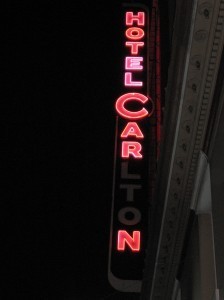Allan G. Hunter's Blog, page 81
March 6, 2011
Ask Allan: Practical advice in trying times
Here's an interesting one that just arrived.
Bill and his wife (both professionals in their 40s) had been invited to a party by a friend, who particularly insisted they come. When they got there they found no one they knew, and no one wanted to talk with them for more than a few moments - - groups of long-term friends quickly gathered to chat, excluding Bill and his wife. They tried to make contact with others in the room, and were politely dismissed. The host and hostess were busy talking with others. What should he have done, he asks?
Well — I'm assuming here that Bill and his wife were reasonably acceptable human beings, since they'd been specifically invited. Bill says that he made efforts to talk with others, but was not successful. He was left wondering why everyone preferred to talk amongst themselves rather than include himself and his wife.
As for what to do - there are several possible routes Bill could have gone down. He could have chosen to get outrageously drunk, for example, but that probably wouldn't have got him the sort of attention he needed. The point is, that it is the host's job to make people welcome, and this applies even if the guest is difficult, deaf, or ornery. This did not happen. The only possible action left to Bill and his wife was to slip away as soon as possible, causing minimal fuss. They could always make excuses later.
Better yet - slip away early and have a nice dinner somewhere, to shake off that bad energy.
This may look like running away, so I'd defend it as reasonable and constructive as follows. If Bill had stayed put, feeling more and more uncomfortable, he'd have become visible, at some point, to everyone in the room, and this would have made everyone else uncomfortable. Sooner or later the Party Bore (there's always one) would have wandered over, and this would have made Bill feel even less like he was having a good time. He'd have wasted time, been bored to death, and looked like a social flop. This is a losing proposition. Leaving was by far the best option.
If we take this one step further we can think of this in terms of archetypes. Abandoned in his corner of the room, Bill felt like a misfit, like an ORPHAN. When this sort of thing happens it's always worth remembering that if we feel as if we're Orphans, then it's probably because we're surrounded by other Orphans. The difference was that those other Orphans had managed to get 'adopted' by their own groups (to which they were not allowing any admittance; just like junior high school cliques). So, what Bill was witnessing was a social situation in which almost everyone was trying to 'fit in' - they were so anxious and intent on this that they had no time, no generosity of spirit, for others.
By walking away Bill and his wife preserved their sense of personal authenticity, even in a difficult situation. At the end of the day, we can't do much about what other people think or choose to do. We can only look out for ourselves and treat ourselves properly.
It's a good idea, always, to check how you feel at an event, and then work out where that feeling is coming from. It may not be your problem or your anxiety that you're feeling. It may be someone else's.
February 27, 2011
Energy crisis? What energy crisis?
With Lybia in turmoil, and the Saudis shyly announcing that they may have already passed peak oil — which means it's running out — we may want to think about how we use oil.
But we won't. If we did so we'd be faced with a startling fact. We LIKE wasting resources. We like doing it because it makes us feel important and powerful, and few things do that as well as rushing around in cars and planes doing things we don't really need to do.
The energy crisis has to do with a shortage of oil. But it also has to do with our own inability to face an existence that doesn't feel vital unless we're running around a lot, consuming. The crisis might, therefore, be seen as a mirror of our own fear of inner emptiness.
And so we squander the earth's resources.
February 15, 2011
Just in….
I'm delighted to let you know of the New Dimensions Café audio interview with me entitled "Fairytales as Healing Stories."
Go to www.newdimensions.org and scroll down. Watch for a coffee cup icon on the left side for the New Dimensions Café. Click on that icon and you'll find a 17 minute dialogue that I recently had with Justine Willis Toms. You can hear it streaming or can download it for FREE.
If you would like to subscribe to the New Dimensions Café podcast which features many of the guests that appear on New Dimensions it's available for a free subscription on the website as well. There are also over 900 hour long programs in their extensive archive which can be downloaded for a small fee.
February 13, 2011
Alice In Wonderland
Yes - I know I'm late to the feast. I finally plucked up courage and watched Disney's 'Alice in Wonderland'. This is, it should be said, Disney's 'Alice', only.
Watching it reminded me of an encounter, many years ago, in a Tunisian cafe, outside Sfax. I explained to the waiter that my friend wanted a vegetarian dish. He nodded and made all the right gestures that indicated he had understood my French. When he came back it was with a large bowl of steaming food, out of the center of which protruded the limb of some animal, possible the hind quarter of a goat. I pointed out that this was not vegetarian. Outraged, he poured some of the mix onto a plate and, using his fingers, pulled out a small greenish thing. 'There!' he declared, 'There is a vegetable!'
The same thing is true of Disney's 'Alice', which has about as much in common with Lewis Carroll as … well, you get the picture.
But if I had to single out one truly disturbing aspect of Disney's cruel co-opting of a story, it would be to point out that the young Alice is routinely presented in the process of falling out of her clothes, or growing too big for them, which allows the film-makers to show a lot of her skin in a sort of thinly-veiled strip-tease. Since she's - well, what age is she? - and what age is this movie aimed at? Suitable for young children and adults, says the screening guide. I found it disturbing that an actress of about 13 was presented in this way, when the (remixed) plot announced she was playing the role of a 19 year old; not 10 as the original Alice was.
Confused? So was I. Child exploitation, or worse? Oh yes.
February 9, 2011
Rituals
I'm currently working on a book that looks at the social and personal rituals we have in our lives, and it points out that we've abandoned many of the more historically venerated rituals. Often this is good. But when we throw out a ritual, what is it we're throwing out, exactly? In many cases the understandings and reassurances that held earlier generations together, and provided them with a sense of social stability are thrown out, too. For example, children progress through schools, in a sort of lock-step that has to do with exams and graduating. Unfortunately the emphasis is on the exams and passing them, rather than in developing a sense of personal awareness or individual responsibility, which might be a better way of approaching adulthood. Certainly it would be more helpful in navigating the outside world. The rituals of 'graduation' and of being promoted to new class levels have been ignored. Graduation itself is an excuse to dress up, these days, and little more.
If we take another example, we could observe that almost everyone takes a driving test. It's just a chore we have to get through. Yet huge numbers of teenage drivers in the US kill themselves and others because they can't handle to responsibility of being in charge of a large, powerful motor vehicle. It's the leading cause of death for US teens. These young people are trained for the test, but not taught about how to handle their own responses to power. Is this really so very different from the ancient legend of Phaeton, who drove the sun-chariot, lost control of it, and was killed? The Greeks had that legend for a reason.
Again, in the USA we have the right to 'bear arms' - and every year about 11,000 people die in gun related incidents. That's over twice as many deaths as were incurred by US forces in nearly 10 years of full scale war in Iraq. The point is that the law guarantees these rights, but there are few understandings about the responsibilities involved. Laws cannot save us from ourselves.; responsibilities can, and they are taught through story, legend and ritual.
That may be at least one reason we need myths, legends, and rituals. We ignore them at our peril.
February 7, 2011
The New Yorker - bad for your health?
Columnist Jerome Groopman is an MD who writes about health issues for The New Yorker. He is a good writer and comes across as a caring physician - and if you value your mental health you will not read him.
Each time he appears he writes in the persona of the concerned practitioner. Yet the arc of his narrative is always the same:
Open - to dramatic scene of suffering (tug at heart strings);
Cut - to concerned doctor, and how he got started;
Intercut - episodes of concerned doctor, patient, patient's nearest and dearest, other doctors. Repeat as space allows.
Close - thoughtful, inconclusive meditation on the mysteries of science. The narrative comes to a close as puzzled, but good-guy doctor makes progress, but does not achieve total cure.
The message in every case is circumscribed by this narrative arc, which is eerily similar to a bad Hollywood movie's structure. It says, in effect: we super-hero doctors are trying hard, and we made real progress this time, but watch out! Those nasty germs will be back, and we'll have to fight them! So, stand back and let us do our heroic work!
This 'Doctor-as-Batman' ideal, where the MD serves a startled but grateful populace, is a dangerous myth. It is also self-serving for MD Groopman. It is indeed his 'style' of writing - or what I'd call his formula.
If you've ever had a dangerous disease (as I have), one that has stumped the specialists, what you'll usually find is not a doctor who will take infinite pains to cure you. You are much more likely to find doctors who hand you on to the next 'specialist' before they disappear from sight and responsibility. In the meantime, you will grow weaker, and perhaps come near to death. Perhaps you will die. I nearly did. The doctor wouldn't know if you did, because by now you've been referred to so many other practitioners that she or he's long forgotten about you. unless you are very wealthy this is what you can expect.
Groopman shows his posturing most clearly in two places. The first is he never, ever, refers to alternative medicine or complementary treatments. The patient is always an object to be treated to yet more 'tests'. The second aspect emerges from this. He almost never mentions the mental distress of his patients. In the most recent article (Feb 7th, 2011), a very young girl with food allergies is treated with repeated 'tests'; if they go well she can stomach the food. If not she has a violent allergic reaction, vomits, and shows signs of distress. In one case she is, as a precaution, hooked up to an IV with the correct cocktail of antidotes, before she bites the specially baked muffin that is the 'test' food. Ask yourself what sort of effect this will have on a young child, psychologically, when repeated over a course of years. think about eating disorders and young women, for instance.
Groopman doesn't bother to ask such questions.
Neither does he ask about other causes of allergies (environmental, etc. etc) which he merely mentions in passing. He doesn't ever approach such ideas as acupuncture, massage, or even yoga, which have saved many 'incurable' cases.
If the medium has some impact on the message (as we are all so fond of recalling) then Groopman's article begs important questions about the truths we are expected to follow, or perhaps swallow. And I gag on his.
The New Yorker is not doing a public service by printing Groopman's words, which have the effect or making the reader feel passive, helpless, and even frightened. At the same time he creates the aura of the bold and fearless genius who is 'the doctor', in contradiction to everything we actually know to be the case.
Dramatic stories that mislead us are, in fact, closer to propaganda than to journalism.
January 26, 2011
California
It seems like it was a long time ago, but in fact it's been about 10 days - 10 days of starting the Curry College new semester, to be sure, and shoveling snow. No wonder it seems like a long time ago that I was strolling San Francisco's hilly streets.
My purpose for being there ? To do the New Dimensions Radio interview, which should be out in the world soon, so keep watching this space. It's a full hour (divided into 4 segments) and there's also a 20 minute 'cafe' section. I'm talking about things I love - the role of literature as a way of reflecting on who we are - and the time just flew by. I hope it will for you when you listen.
And the picture? San Francisco seen from the place I had breakfast in Sausolito - on the way to the studio.
January 19, 2011
Poetry
 This gold crown is from about 3000 BC, and is from an area that we later learned to call Greece. It is, almost certainly, a crown designed to look like laurel leaves, sacred to Apollo and to poets.
This gold crown is from about 3000 BC, and is from an area that we later learned to call Greece. It is, almost certainly, a crown designed to look like laurel leaves, sacred to Apollo and to poets.
At that time in history finding and refining and working gold so exquisitely would have taken an enormous amount of time, effort and skill. And, if I'm correct, they did it so they could honor a poet. Poets, who tell us about the largeness of our souls, and the deeper truths. Poets, who can open our hearts to courage when our heads want to remain petty and cautious.
We can learn from those ancients, if we choose to.
January 17, 2011
California
We stayed at the most delightful hotel - the Carlton. It had free wine in the lobby each night, so the guests could feel 'at home' and it was such a friendly place that it was almost a shock to see how efficient they were, too.
One slight quirk was that at night not all the letters in the sign worked, so we were alternately in the Hotel Carton (definitely not a cardboard box) or the Hotel Carn.
How could one not love such a place?
All part of the fun!
January 16, 2011
The West Coast
I've been in San Francisco for the past week, avoiding the Boston snow, and doing some promotional stuff for the books. New Dimensions Radio (which I'm sure some of you know since they syndicate with NPR) was kind enough to host a show about 'Princes, Frogs and Ugly Sisters'. Catch it if you can – it's a full hour and covers a fair amount that isn't covered in the book, so it has added value. Justine Toms is an inspired and inspiring interviewer – and she loves Grimm's Tales.
While there I also put in a cameo at Mendocino County Bookstore, just for good measure. It's always good to see smaller, independent bookstores doing so well with truly interesting books on their shelves. Thus encouraged I was also delighted to be the speaker at Fields Bookstore in SF itself, just a few days later. For those of you who don't know about Fields, it's a real gem, with plenty of unusual books from Acupuncture to Zen, Authorship to Zyzygy.
I now know San Francisco a little better, and the city is still one of the most beautiful I've ever seen. I know — there's poverty and ugliness even here, but those views…. The sense of sky, the air…. The city has its own poise.
But one can only dream about living there up until the moment one sees the houseprices. There's a market that doesn't seem to have softened at all….






